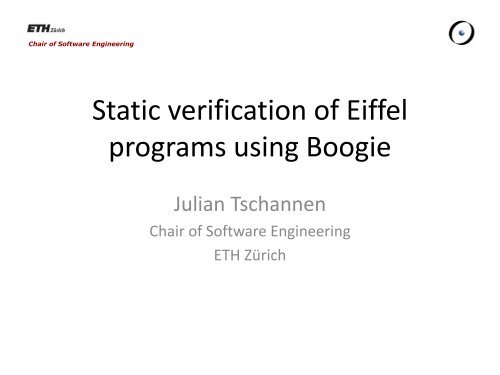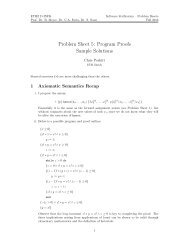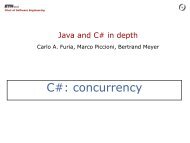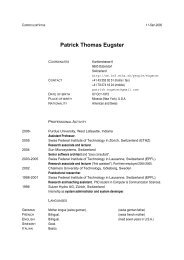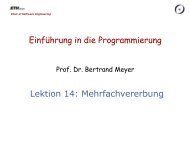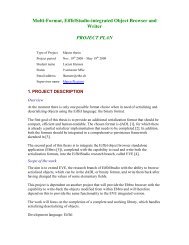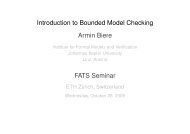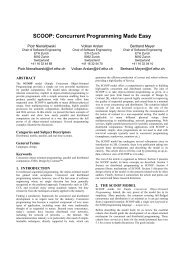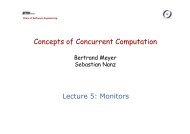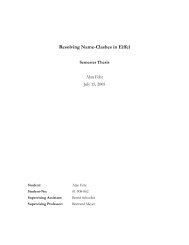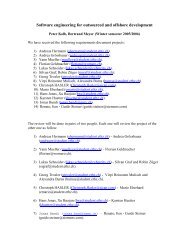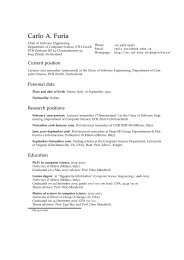Static verification of Eiffel programs using Boogie - Chair of Software ...
Static verification of Eiffel programs using Boogie - Chair of Software ...
Static verification of Eiffel programs using Boogie - Chair of Software ...
You also want an ePaper? Increase the reach of your titles
YUMPU automatically turns print PDFs into web optimized ePapers that Google loves.
<strong>Chair</strong> <strong>of</strong> S<strong>of</strong>tware Engineering<br />
<strong>Static</strong> <strong>verification</strong> <strong>of</strong> <strong>Eiffel</strong><br />
<strong>programs</strong> <strong>using</strong> <strong>Boogie</strong><br />
Julian Tschannen<br />
<strong>Chair</strong> <strong>of</strong> S<strong>of</strong>tware Engineering<br />
ETH Zürich
Topics<br />
• Introduction to <strong>Eiffel</strong> and <strong>Boogie</strong><br />
• AutoPro<strong>of</strong><br />
• Translation<br />
– Types and inheritance<br />
– Heap model and object creation<br />
– Routines and frame conditions<br />
– Generics<br />
– Polymorphic calls<br />
2
• Object-oriented<br />
• Multiple inheritance<br />
• Generics<br />
• Design by contract<br />
– Preconditions<br />
– Postconditions<br />
– Class invariants<br />
– Loop invariants<br />
Introduction to <strong>Eiffel</strong><br />
3
<strong>Eiffel</strong>: Code example<br />
class ACCOUNT<br />
create make<br />
feature<br />
balance: INTEGER<br />
make<br />
do<br />
balance := 0<br />
ensure<br />
balance_set: balance = 0<br />
end<br />
deposit (amount: INTEGER)<br />
require<br />
amount_not_negative: amount >= 0<br />
do<br />
balance := balance + amount<br />
ensure<br />
balance_increased: balance = old balance + amount<br />
end<br />
end<br />
4
Introduction to <strong>Boogie</strong><br />
• Specification language<br />
– Types<br />
– Mathematical functions<br />
– Axioms<br />
• Non-deterministic imperative language<br />
– Global variables<br />
– Procedures with pre- and postconditions<br />
– Control structures (conditional, loop, goto)<br />
• Supports different back-end verifiers<br />
(e.g. Z3 or simplify)<br />
5
<strong>Boogie</strong>: Code example<br />
type person;<br />
const eve: person;<br />
function age(p: person) returns (int);<br />
function can_vote(p: person) returns (bool);<br />
axiom (age(eve) == 23);<br />
axiom (forall p: person :: can_vote(p) age(p) >= 18);<br />
var votes: int;<br />
procedure vote(p: person);<br />
requires can_vote(p);<br />
ensures votes == old(votes) + 1;<br />
modifies votes;<br />
implementation vote(p: person) {<br />
votes := votes + 1;<br />
}<br />
6
AutoPro<strong>of</strong><br />
• <strong>Static</strong> <strong>verification</strong> <strong>of</strong> a subset <strong>of</strong> <strong>Eiffel</strong><br />
• Part <strong>of</strong> EVE (<strong>Eiffel</strong> Verification Environment)<br />
• Covers:<br />
– Assignment, conditionals, loops<br />
– Routine calls, object creation<br />
– Integer arithmetic, boolean arithmetic<br />
– Agents, generics<br />
– Polymorphic calls<br />
7
AutoPro<strong>of</strong> workflow<br />
<strong>Eiffel</strong><br />
AST<br />
<strong>Eiffel</strong>Studio AutoPro<strong>of</strong> <strong>Boogie</strong><br />
<strong>Eiffel</strong><br />
Errors<br />
<strong>Boogie</strong><br />
File<br />
<strong>Boogie</strong><br />
Errors<br />
• Translates AST from <strong>Eiffel</strong>Studio to <strong>Boogie</strong><br />
• Uses <strong>Boogie</strong> verifier to check <strong>Boogie</strong> files<br />
• Traces <strong>verification</strong> errors back to <strong>Eiffel</strong> source<br />
8
• Background theory<br />
<strong>Boogie</strong> file layout<br />
– Definitions and axioms<br />
• Classes to be proven<br />
– Type definition<br />
– Routine signatures<br />
– Routine implementations (this is proven)<br />
• Referenced routines<br />
– Routine signature<br />
9
Demo: Account<br />
10
Translating <strong>Eiffel</strong> to <strong>Boogie</strong><br />
• Types and inheritance<br />
• Heap model and object creation<br />
• Routines and frame conditions<br />
• Generics<br />
• Dynamic contracts<br />
11
Encoding types<br />
• <strong>Boogie</strong> type for <strong>Eiffel</strong> types<br />
type Type;<br />
• Type declaration<br />
const unique ACCOUNT: Type;<br />
• Encoding inheritance<br />
axiom ACCOUNT
• Reference type<br />
References and the heap<br />
type ref; const Void: ref;<br />
• Generic field type<br />
type Field _;<br />
• The heap type is a mapping from references<br />
and fields to generic values<br />
type HeapType = [ref, Field beta]beta;<br />
• The heap is a global variable<br />
var Heap: HeapType<br />
13
Ghost fields and attributes<br />
• Ghost field to store allocation status <strong>of</strong> objects<br />
const unique $allocated: Field bool;<br />
• Ghost field to store type <strong>of</strong> objects<br />
const unique $type: Field Type;<br />
• Field declaration for each attribute<br />
• Generic field type instantiated with <strong>Eiffel</strong> type<br />
const unique field.ACCOUNT.balance: Field int;<br />
14
Using the heap<br />
• Functions and axioms <strong>using</strong> heap<br />
function IsAllocated(heap: HeapType, o: ref)<br />
returns (bool);<br />
axiom (forall heap: HeapType, o: ref ::<br />
IsAllocated(heap, o) heap[o, $allocated]);<br />
• Assignment to attribute<br />
implementation create.ACCOUNT.make(Current: ref) {<br />
Heap[Current, field.ACCOUNT.balance] := 0;<br />
}<br />
make<br />
do<br />
end<br />
balance := 0<br />
15
Creating objects on the heap<br />
• Allocate a fresh reference on Heap<br />
• Set type and call creation routine<br />
implementation {<br />
var temp_1;<br />
entry:<br />
havoc temp_1;<br />
assume (temp_1 != Void) &&<br />
(!Heap[temp_1, $allocated]);<br />
Heap[temp_1, $allocated] := true;<br />
Heap[temp_1, $type] := ACCOUNT;<br />
call create.ACCOUNT.make(temp_1);<br />
}<br />
local<br />
a: ACCOUNT<br />
do<br />
create a.make<br />
end<br />
16
• Signature consists <strong>of</strong><br />
– Arguments<br />
– Contracts<br />
– Frame condition<br />
Routine signatures<br />
deposit (amount: INTEGER)<br />
require<br />
amount >= 0<br />
do<br />
…<br />
ensure<br />
balance = old balance + amount<br />
end<br />
invariant<br />
balance >= 0<br />
17
Encoding routine signatures<br />
procedure proc.ACCOUNT.deposit(<br />
Current: ref,<br />
arg.amount: int);<br />
// Precondition and postcondition<br />
requires arg.amount >= 0;<br />
ensures Heap[Current, field.ACCOUNT.balance] ==<br />
old(Heap[Current, field.ACCOUNT.balance]) +<br />
arg.amount;<br />
// Invariant<br />
free requires Heap[Current, field.ACCOUNT.balance] >= 0;<br />
ensures Heap[Current, field.ACCOUNT.balance] >= 0;<br />
// Frame condition<br />
modifies Heap;<br />
ensures (forall $o: ref, $f: Field alpha ::<br />
$o != Void && IsAllocated(old(Heap), $o) &&<br />
(!($o == Current && $f == field.ACCOUNT.balance))<br />
==> (old(Heap)[$o, $f] == Heap[$o, $f]));<br />
18
Frame condition<br />
• Describe effect <strong>of</strong> a routine on heap<br />
• Important for modular pro<strong>of</strong>s<br />
• Different ways to express frame condition<br />
– Modifies clauses<br />
– Separation logic<br />
– Ownership types<br />
– …<br />
19
Frame condition in <strong>Eiffel</strong><br />
• Modifies clauses<br />
– What attributes a routine may modify<br />
– Needs change to <strong>Eiffel</strong> language<br />
deposit (amount: INTEGER)<br />
require<br />
amount >= 0<br />
ensure<br />
balance = old balance + amount<br />
modify<br />
balance<br />
end<br />
• Automatic extraction <strong>of</strong> modifies clause<br />
– All attributes mentioned in postcondition<br />
20
Encoding frame conditions<br />
• Modify whole heap<br />
• Express unchanged parts for each routine<br />
procedure proc.ACCOUNT.deposit(<br />
Current: ref, arg.amount: int);<br />
modifies Heap;<br />
ensures (<br />
forall $o: ref, $f: Field alpha ::<br />
$o != Void &&<br />
IsAllocated(old(Heap), $o) &&<br />
(!($o == Current && $f == field.ACCOUNT.balance))<br />
==><br />
(old(Heap)[$o, $f] == Heap[$o, $f])<br />
);<br />
21
Pure functions<br />
• Functions which have no side-effects<br />
• Partial automation <strong>of</strong> detecting pure functions<br />
– Each function that is used in a contract<br />
• Functions can be marked as pure<br />
• Purity is checked by <strong>Boogie</strong><br />
• Simple encoding<br />
procedure proc.ARRAY.length(Current: ref)<br />
modifies Heap;<br />
ensures Heap == old(Heap);<br />
22
Generics<br />
• Distinguish between definition <strong>of</strong> generic<br />
classes and use <strong>of</strong> generic routines<br />
• Replace generics with a semantic equivalent<br />
– For each generic class, replace generic parameter<br />
with its constraint<br />
– For each generic routine, create routine signature<br />
for each derivation used<br />
– When a generic routine is used, use signature <strong>of</strong><br />
specific derivation<br />
23
Generic classes<br />
class CELL [G -> ANY]<br />
feature<br />
item: G<br />
set_item (a_item: G)<br />
do<br />
item := a_item<br />
ensure<br />
item = a_item<br />
class CELL<br />
end<br />
feature<br />
end<br />
item: ANY<br />
set_item (a_item: ANY)<br />
do<br />
item := a_item<br />
ensure<br />
item = a_item<br />
end<br />
end<br />
24
local<br />
do<br />
end<br />
Generic routines used<br />
l_cell1: CELL [STRING]<br />
l_cell2: CELL [INTEGER]<br />
create l_cell1; l_cell1.set_item ("abc")<br />
create l_cell2; l_cell2.set_item (7)<br />
procedure proc.CELL#STRING#.set_item(<br />
Current: ref,<br />
procedure proc.CELL#INTEGER#.set_item(<br />
arg.a_item: ref<br />
);<br />
Current: ref,<br />
ensures Heap[Current, arg.a_item: int field.CELL#STRING#.item]<br />
);<br />
== arg.a_item;<br />
modifies<br />
ensures<br />
Heap;<br />
Heap[Current, field.CELL#INTEGER#.item]<br />
ensures ;<br />
== arg.a_item;<br />
modifies Heap;<br />
ensures ;<br />
25
Polymorphic calls<br />
• Dynamic type might have different contract<br />
than static type<br />
– Weaker precondition<br />
– Stronger postcondition<br />
• If dynamic type is known, we can use the<br />
dynamic contract for the pro<strong>of</strong><br />
• We use uninterpreted functions to encode<br />
dynamic contracts<br />
26
• Strategy pattern<br />
CONTEXT<br />
Motivating example<br />
STRATEGY*<br />
execute*<br />
STRATEGY_A STRATEGY_B<br />
• Implementations <strong>of</strong> execute strengthen<br />
postcondition to express their behavior<br />
27
Demo: Strategy Pattern<br />
28
Encoding parent postcondition<br />
• Define uninterpreted function for postcondition<br />
• Link function to actual postcondition depending<br />
on type<br />
function post.STRATEGY.execute(h1, h2, current)<br />
returns (bool);<br />
procedure proc.STRATEGY.execute(Current: ref);<br />
ensures post.STRATEGY.execute(<br />
Heap, old(Heap), Current)<br />
axiom (forall h1, h2, current ::<br />
h1[current, $type] <br />
(post.STRATEGY.execute(h1, h2, current) ==><br />
));<br />
29
Encoding child postcondition<br />
• Link function for parent postcondition to<br />
strengthened postcondition for child type<br />
axiom (forall h1, h2, current ::<br />
h1[current, $type] <br />
(post.STRATEGY.execute(h1, h2, current) ==><br />
));<br />
• For a child object, the postcondition function<br />
will imply both postconditions<br />
30
Encoding dynamic preconditions<br />
• Inverse implication: actual precondition<br />
implies precondition function<br />
function pre.STRATEGY.execute(h1, current)<br />
returns (bool);<br />
procedure proc.STRATEGY.execute(Current: ref);<br />
requires pre.STRATEGY.execute(Heap, Current)<br />
axiom (forall h1, current ::<br />
h1[current, $type] <br />
( ==><br />
pre.STRATEGY.execute(h1, current) ));<br />
31
Call site example<br />
implementation {<br />
var s: ref;<br />
entry:<br />
assume Heap[s, $allocated] && s != Void;<br />
assume Heap[s, $type] == STRATEGY_A;<br />
}<br />
call // call proc.STRATEGY.execute(s);<br />
assert pre.STRATEGY.execute(Heap, s);<br />
h_old := Heap;<br />
havoc Heap<br />
assume ;<br />
assume post.STRATEGY.execute(Heap, h_old, s);<br />
assert ;<br />
axiom (forall h1, h2, current ::<br />
h1[current, $type] <br />
(post.STRATEGY.execute(h1, h2, current) ==><br />
));<br />
32
Conclusions<br />
• Automatic <strong>verification</strong> <strong>of</strong> object-oriented<br />
<strong>programs</strong> <strong>using</strong> an intermediate <strong>verification</strong><br />
language<br />
• Different ways <strong>of</strong> translation<br />
– Mapping <strong>Eiffel</strong> semantics to <strong>Boogie</strong><br />
– <strong>Eiffel</strong> side source-to-source translation<br />
• Modularity <strong>of</strong> pro<strong>of</strong>s allows to partially prove<br />
a program<br />
33
Theses<br />
• You can do your master’s thesis, bachelor’s<br />
thesis or a semester thesis with us<br />
• Topics:<br />
– <strong>Static</strong> and dynamic <strong>verification</strong> <strong>of</strong> objectoriented<br />
<strong>programs</strong><br />
– Specification <strong>of</strong> <strong>programs</strong><br />
• Contact me:<br />
julian.tschannen@inf.ethz.ch<br />
34


